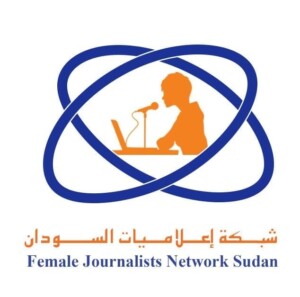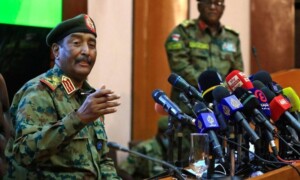Lack of confidence in Sudan’s military reflected in rejection of El Burhan’s speech
The speech of Gen Abdelfattah El Burhan on Monday, in which he announced the military’s withdrawal from the current governing bodies, and gave the civilian opposition groups in the country the opportunity to form a government of technocrats, has mostly been met with scepticism and rejection.
 The anti-junta sit-in at El Muassasa on Sunday evening (Social media)
The anti-junta sit-in at El Muassasa on Sunday evening (Social media)
The speech of Gen Abdelfattah El Burhan on Monday, in which he announced the military’s withdrawal from the current governing bodies, and gave the civilian opposition groups in the country the opportunity to form a government of technocrats, has mostly been met with scepticism and rejection.
El Burhan, Chairman of the Sovereignty Council and the Commander of the Sudanese army said in a televised speech aired on Monday evening that the military would withdraw from the current national dialogue, facilitated by the AU-IGAD-UNITAMS Trilateral Mechanism.
The Sovereignty Council will be dissolved after the formation of a new, independent government of civilian technocrats, that is to complete the tasks of the transitional period. Concerning the role of the military, El Burhan said that a High Council of the Armed Forces will be formed by commanders of the army and the Rapid Support Forces (RSF) to assume the supreme command of the regular forces, in agreement with the new government.
El Burhan's announcement was widely rejected by the resistance committees and other opposition groups in the country, while opinions varied within the forces that allegedly support the current authority.
Radio Dabanga's Facebook page witnessed wide discussions about the pros and cons of the new developments. It is expected that the coming days will witness rapid developments on several levels.
‘Tactics’
The mainstream Forces for Freedom and Change, the FFC-Central Council, an alliance of opposition parties and groups working on their own, unified vision for putting an end to the rule of the military called the speech “a tactical retreat in light of popular pressure”.
Omar El Degeir, head of the Sudanese Congress Party, said in a press conference at the Umma Party House in Omdurman on Tuesday following a meeting of the FFC-CC Executive Office, that the speech “smells of guardianship over the people in forming their institutions and determining the form of dialogue and government”.
He described the speech as “a generalisation, attempting to camouflage the military’s real intentions and to create confusion, and which ignores the main cause of the crisis, which is the October 2021 coup” – which cost Sudan $4.4 bn in suspended aid.
The decisions by the military “aim to fully seize sovereign power in Sudan and to keep holding the strings of the game,” he stated. “The speech did not touch anything with regard to the revolution's demands, such as a unified professional army, the transfer of economic institutions owned by the military to the Ministry of Finance, in addition to issues of justice, the economy and people's livelihood.”
‘Ambiguous’
The FFC-National Accord (FFC-NA) faction, a split-off group from the FFC led by a number of former rebel leaders, sees besides positive points, also a number of ambiguous points in the speech of El Burhan, that need to be clarified, and other.
Mubarak Ardol, Secretary-General of the FFC-NA, also known as National Accord Forces, said in a press briefing following a meeting of the faction’s leaders in Khartoum on Tuesday morning that the meeting stressed the need to adhere to and complete the 2020 Juba Peace Agreement.
He affirmed their support for the dialogue facilitated by the Trilateral Mechanism, and called on all political forces in the country “to engage in the dialogue and form a consensual government that will bring the democratic process back on its right track”
The National Accord Forces will “enter the dialogue with an open mind in order to solve the crisis”, Ardol said and emphasised the need “to purify the atmosphere from hate speech and enter a new stage”.
Welcomed
The mainstream Democratic Unionist Party, chaired by Mohamed Osman El Mirghani, and the Nationa Umma Party (NUP) faction headed by Mubarak El Fadil welcomed the decisions announced by El Burhan. Both political parties said that the plans coincide with what they themselves proposed.
“We stress the need for a Sudanese-Sudanese dialogue away from the dialogue facilitated by the Trilateral Mechanism,” the NUP-El Fadil stated yesterday. The party called on all political forces “to rise above their own struggles and work towards completing the democratic transformation”.
‘Nothing new’
The resistance committees active in the neighbourhoods of cities and in villages of the country downplayed the importance of El Burhan's announcement on Monday. “The speech did not carry anything new,” Mohamed Taher, a spokesperson for the Ombadda Resistance Groups in Omdurman told Radio Dabanga.
“El Burhan's decisions to form a High Council of the Armed Forces to be responsible for security and defence are worse than the previous partnership formula,” Taher said, and emphasised the people’s adherence to full civilian rule.
Other members of resistance committees, who preferred to withhold their names, also consider the new decisions an attempt “to aim to gain more dominance and control by the military over security issues, the economy and foreign relations.”
Mohamed El Nayer, spokesperson for the mainstream Sudan Liberation Movement under the leadership of Abdelwahid El Nur also said that the speech “did not bring anything new”. In a statement yesterday, he called the speech “a desperate attempt to break the mass siege imposed on the putschists [by the mass protests] and to create a gap between the various revolutionary groups”.
‘Desperate attempt’
The Sudanese Professionals Association (SPA), the driving force behind the 2019 revolution, described El Burhan's speech “as a desperate attempt to cling to power’.
El Waleed Ali, a spokesperson for the SPA, told Radio Dabanga that the military plan to bring all security, foreign, political and economic powers together under the High Council of the Armed Forces.
“Any government formed under the command of this military council will be the worst of all the governments of the transitional period,” he predicted.
“There is no solution but to continue escalating the protests, with the aim to fully overthrow the military and civilian [Islamist] putschists,” Ali added. “We adhere to the Three No's: No negotiation, No partnership, No legitimacy for the military junta”.
‘Secret settlement’
The Communist Party of Sudan (CPoS) called the speech “a confirmation of the continuation of the military coup of April 2019, and a legalisation of October 2021 coup”.
In statement yesterday, the party’s Political Bureau said that El Burhan’s speech “confirms the validity of rumours in the media that spoke about a political settlement through the formation of both a civilian government and a security and defence council in closed rooms under the auspices of the USA and Saudi Arabia”.
The CPoS declared his categorical rejection of the proposed political settlement and condemns “all the forces that will participate in it”.
According to Noureddin Salaheldin, a leading member of the Sudanese Congress Party, the new military council proposed by El Burhan will mean “an authority parallel to the civilian government”.
He said on his Facebook page yesterday that the announcement of the military’s withdrawal from the political scene is “nothing but misleading”, and called for the continuation of peaceful resistance and the revolutionary forces to unify in order to bring down the coup.
‘Speech for the international community’
The Sudan Revolutionary Front (SRF) alliance of rebel movements that signed the 2020 Juba Peace Agreement and supported the coup last year, did not yet announce its position regarding the speech.
Three SRF leaders, Malik Agar, El Hadi Idris, and El Taher Hajar, are members of the Sovereignty Council, which, according to El Burhan, will be dissolved after the formation of a new civilian government.
Yasir Arman, Deputy head of the Sudan People’s Liberation Movement-North faction headed by Malik Agar however, pointed out in a comment posted by Sudan Tribune yesterday that El Burhan did not mention the rebel movements that signed the Juba Peace Agreement in October 2020.
“The speech is consistent with a confidential memorandum which the military component sent to the Tripartite Mechanism and members of the international community a few days ago,” he further said.
“This speech mainly targets the regional and international community, some of whose members are looking for quick solutions, while others are prioritising stability over democracy, given concerns about internal and regional fragility. The speech seeks to launder a deal through the Tripartite Mechanism that legitimizes the coup by getting civilians who support the coup to choose a Prime Minister who would receive his orders from the General Command, something that was rejected by Salvador Allende in Chile and who paid for it,” Arman stated.











 and then
and then